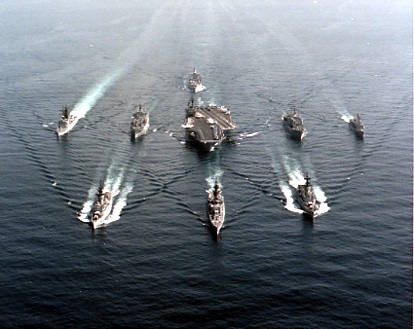A Chinese Miscalculation and Its Lessons
I have one final comment on today’s Washington Post story about North Korea, regarding a quotation from a Chinese academic. Bear in mind that in China, academics are often the voice of government policy and its internal debates. China’s rulers don’t discuss such matters through leaks to the media. In China, the media are smothered, the masses are powerless, and party leaders tend to be survivors of years of purges which have rendered their Darwinian selects into paranoid septuagenarian troglodytes to whom every speck of daylight resembles a peasant’s torch.
Here is what one of those academics said about North Korea today:
“China’s first goal is peace on the Korean peninsula. Denuclearization is a secondary goal,” said Shi Yinhong, an international relations scholar at People’s University, noting that Beijing only put pressure on Pyongyang in 2003 when it appeared the Bush administration was considering military action.
Lesson: if your negotiating opponents don’t fear consequences, they won’t make concessions. China has recently and vividly illustrated that it can make North Korea bend to its will. The problem with China is the absence of that will in regard to North Korea’s nukes, not the means to achieve its ends.
Because the United States is unlikely to consider a military strike in Asia while it is fighting in Iraq, China will not feel much pressure now to take get tough with the North, Shi said. “The U.S. has been neutralized by Iraq, and China has been neutralized by its concern about its strategic relationship with North Korea. And Kim Jong Il knows this,” he added.
And here is the miscalculation. While I doubt that China and the United States are at all likely to fight another war over Korea, U.S. military action is now more possible than ever. Erase from your mind the straw man arguments against a U.S. invasion, which is neither desireable nor likely. Air strikes are almost as unlikely; their scope might not initially be understood as limited, and they could provoke a dangerous reaction. Furthermore, we don’t know where North Korea has its uranium processing facilities.
No, in North Korea, military action will not be a job for the Army, or even primarily for the Air Force. This will be a job for the Navy. If we’re looking at military options, they probably consist primarily of sending a few of these to the North Korean coasts, and see how long they can survive that jolt to their economy. And they’re not busy in Iraq.

The United States has fourteen carrier battle groups. Just one of them could block the Strait of Hormuz, shut off Iran’s oil exports, and bankrupt that within weeks (and as a bonus, France!). I differ with those who say that military action against Iraq precludes effective action against Iran and North Korea as well. The United States cannot and should not get involved in fighting a ground war in Korea. I doubt North Korea would invade, but unless North Korean forces kill Americans or approach Osan, South Korea can deal with that by itself.
Bear in mind that it isn’t necessary to cut off all of North Korea’s sources of income. It is only necessary to shock their economy sufficiently that they have to cut off the support and benefits of a large enough portion of the elite to make North Korea’s political core unstable.